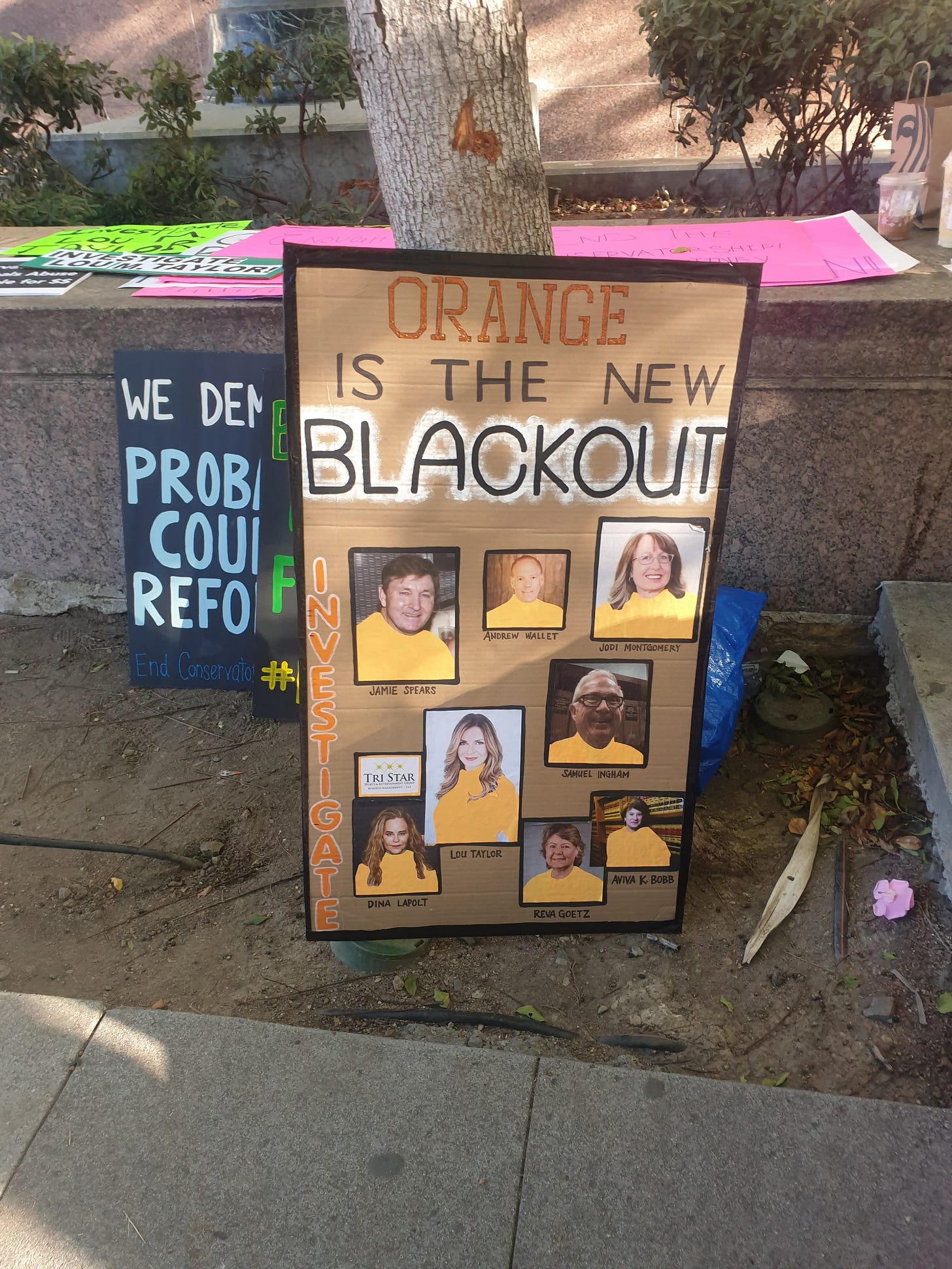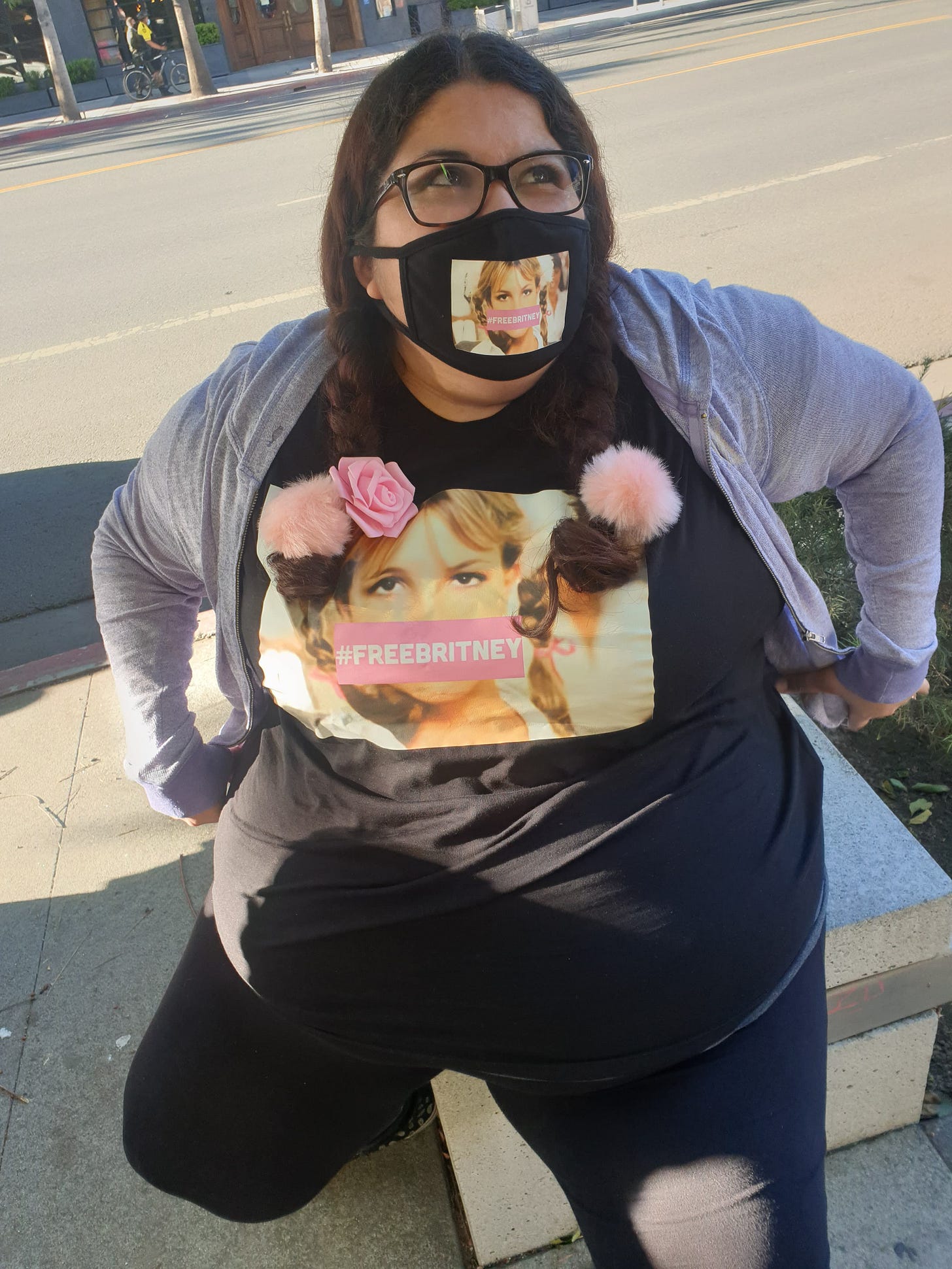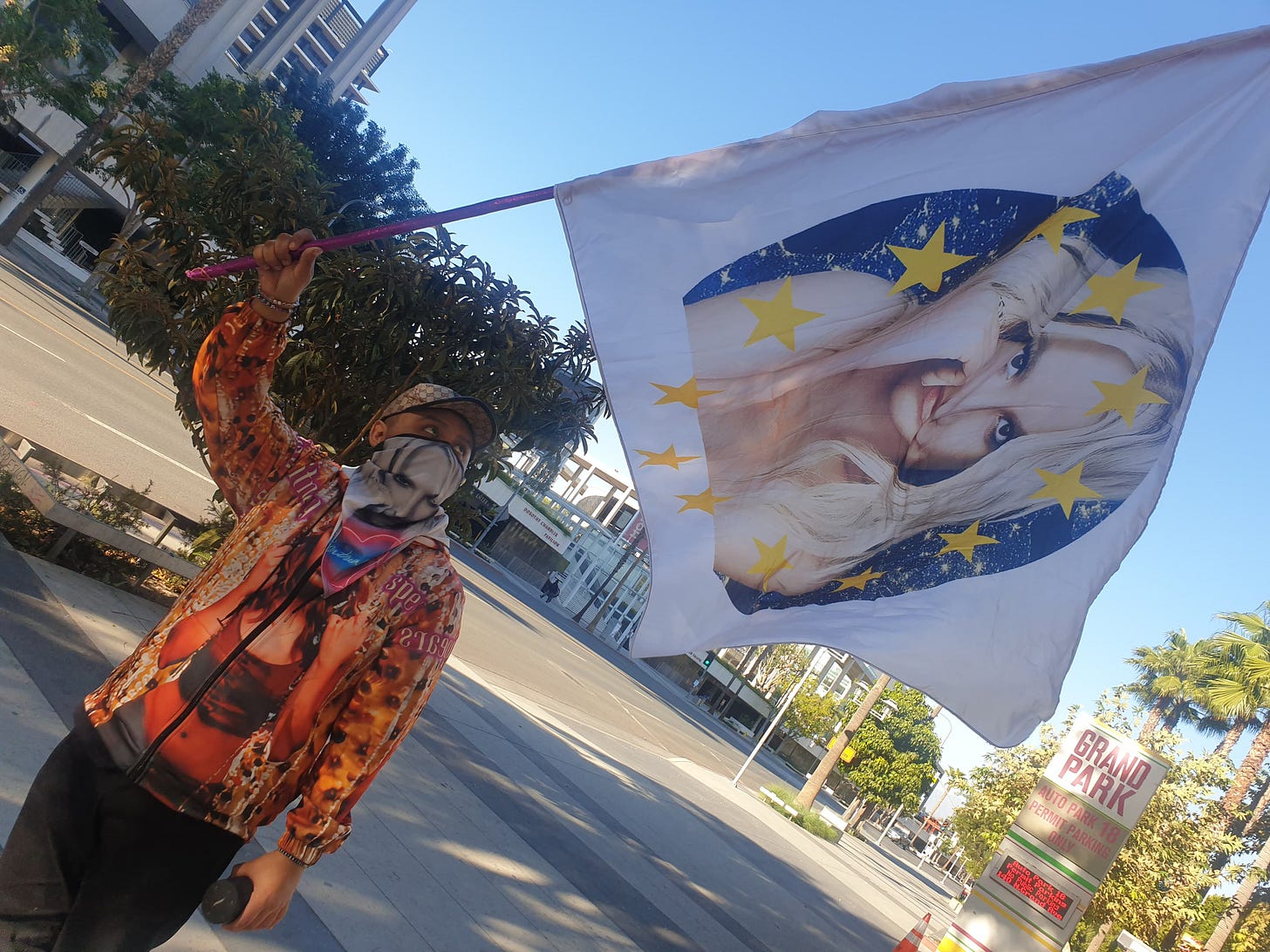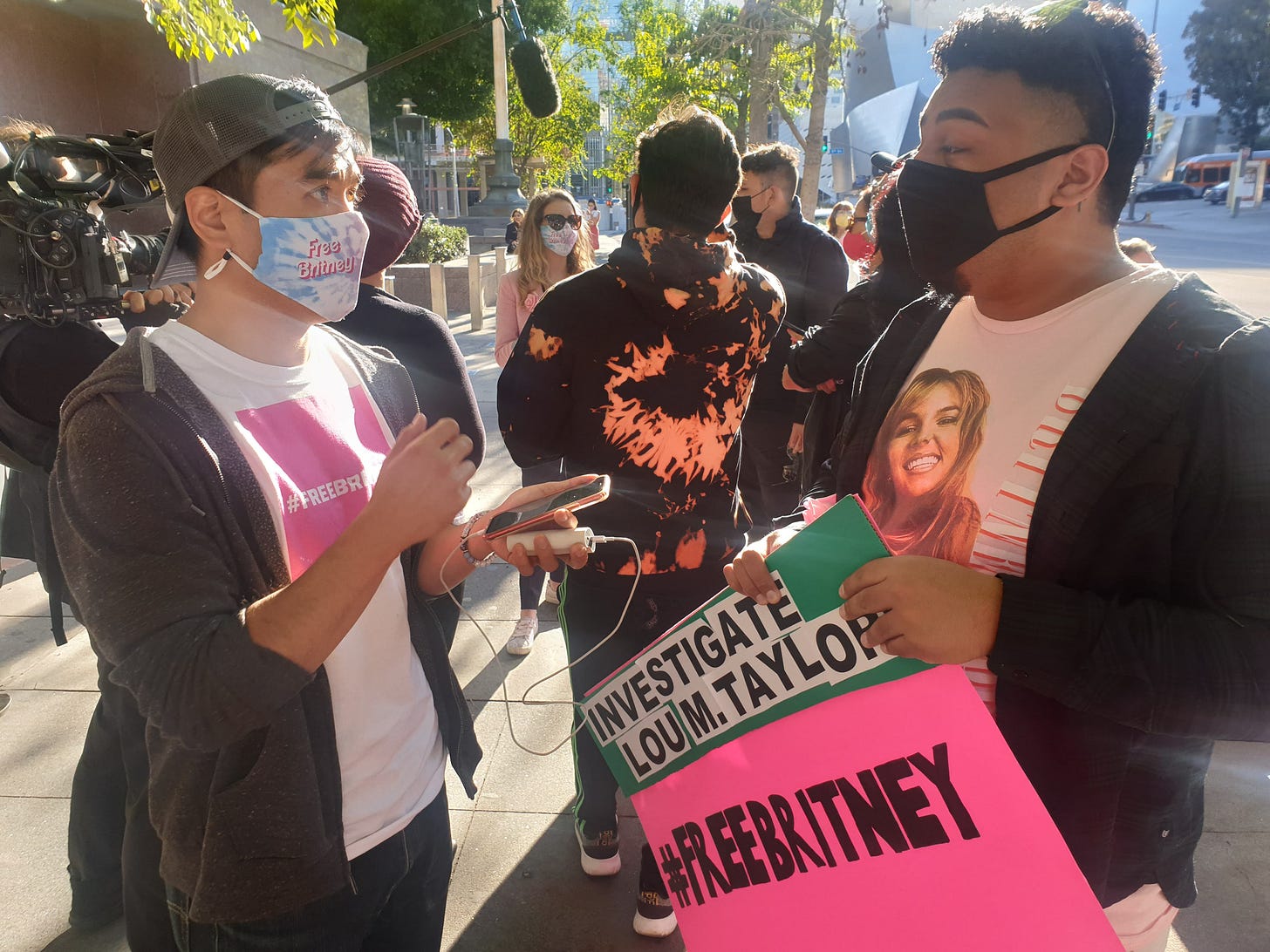THE PRIMAL SCREAM OF #FREEBRITNEY
| PROTEST | How a woke celebrity protest shrouded by conspiracy theories is a bellwether of post-pandemic pop culture
This is Part II of my mildly deranged journey to the #FreeBritney protest, which I’m putting behind the paywall for you, my darling subs. If you missed it, you can catch up on Part I here.
The car drops us off in front of a limestone courthouse. As usual, I’ve arrived fashionably late to the party; the protest started two hours ago and the initial flurry of group photos and Instagram livestreams has died down. A few dozen Britney stans, immediately identifiable by their neon pink clothing, are standing around passively waiting for the court’s decision, chatting in small circles or giving interviews to journalists shouldering big news cameras. The energy is stagnant. The reporters look bored. A single protestor in a Guy Fawkes mask dances around the empty plaza to “Toxic.”
I approach the first person who smiles at me, a Latina woman with a broad face and kind eyes in her early 20s. When I ask her to explain what the hell is going on, she immediately launches into a lengthy explanation of the legal saga that has led up to this moment, spitting out information with the rat-a-tat precision of a professional paralegal. My feverish druggie brain can barely grasp what she’s talking about—the details are too technical, and the names of all the players in this multi-episode drama are like stars in a constellation invisible to the naked eye.
Luckily, I spot this helpful sign on the sidewalk:
Next, I wander over to a booth where a cardboard cutout of Britney is prevailing flimsily against the cold gusts of wind, next to a table stacked with cold pizza and Starbucks coffee. Isolated and ignored in the corner, Britney’s cardboard presence still radiates a warm, golden aura, as if the spirit of Spears is blessing everyone in her radius. Protest signs at her feet depict the faces of other victims of corrupt conservatorships—geriatric elders who find themselves strangely aligned with the pop star in their fight against legal guardianship abuse. (Conservatorships are used to manage the assets of those who are mentally unfit to look after themselves, which typically includes elderly and disabled people, but has also been applied to stars like Spears and Amy Winehouse.)
My dope dealer friend strikes up a conversation with another Britney stan who has fashioned her own DIY #FreeBritney mask. Speaking quietly but passionately, she tells us why this movement is aligned with racial justice causes like Black Lives Matter. “People used to call us conspiracy theorists, but we are just getting woke,” she says with a sweet smile. “Over the last few years, people are waking up to the shit that’s really going on around the world, and we’re standing up for what’s right—we’re not tolerating injustice anymore.” (She also informs me, to my great disappointment, that Britney is not present at the hearing today.)
I sidle up to the protestor in the Guy Fawkes mask, who is dancing around in circles and twirling a FREE BRITNEY sign as a speaker blasts her hits. Taking off her mask, the protestor introduces herself as Gabriella, and tells me that she decided to join this movement in an effort to de-stigmatize mental illness. “I have a mental illness too, and I was misdiagnosed,” Gabriella says. “Is anyone fully in control of themselves? Britney hasn’t had a choice since she was born. She’s suffering the sins of her father.” Then she prances away as her friend Carlos, also dressed in head-to-toe Britney merch, waves a giant Britney flag by its pink sequined handle, staring solemnly at their idol’s pale visage.
Suddenly, there is a burst of activity around the courthouse’s entrance. Several #FreeBritney diehards had been selected to attend the hearing inside the courthouse, and are reporting the details back to the group outside. Britney is hoping today to remove her father as her conservator, and appoint a company called the Bessemer Trust instead.
According to these insiders, Britney’s lawyers argued that Britney is afraid of her father Jamie, and will not work as long as he is in control of her career. Britney’s mother also added, via her lawyers, she she had lost confidence in Jamie after he’d described Britney as a “racehorse” who “should be handled as such,” and thus she also would like Jamie to step back from the conservatorship role.
The judge overseeing the case had just reached a decision: Jamie would remain in the role, and the Bessemer Trust company would be Britney’s co-conservator. “This is actually quite normal!” squeaked a #FreeBritney organizer named Kevin who runs the popular Instagram account @freebritneyla, as he texted furiously on his phone. Later, when I asked him what’s next, he told me that another hearing is scheduled for December 16. “We consider this a small victory, and we’re going to stay loud and put pressure on the court to do the right thing,” he said.
Whatever happens next, the #FreeBritney protest seems like a bellwether of post-pandemic pop culture; it’s impossible to imagine a celebrity protest shrouded by conspiracy theories and framed as a human rights movement happening in any other year—it just seems so 2020. The most mind-blowing revelation I gleaned from popping into this neon pink corner of Britney fandom and meeting its sweetly sincere inhabitants is that social justice wokeness and conspiratorial thinking can share a common logic: the established order is fucked, and in order to overthrow abusive systems of power, you must first “wake up” to the oppressive forces keeping us under control. Only through de-conditioning yourself from official media narratives are you able to build powerful new coalitions driven by public outrage and a sense of moral justice.
This is not a dig against wokeness, but rather, a way to understand the mainstream ascent of both QAnon and protest pop culture that has really popped off in recent months. As the Britney fan put it earlier: “People used to call us conspiracy theorists, but we are just getting woke. Over the last few years, people are waking up to the shit that’s really going on around the world, and we’re standing up for what’s right.”
#FreeBritney also reflects how the celebrity media complex has shifted dramatically in the past decade, as the power once monopolized by paparazzi is democratized across populist social media. Britney’s 2008 breakdown was driven by tabloid economics, when a single photo could cash out to a million dollar payday for a particularly pugnacious professional photographer. Those days are long over—and the tired media trope of “mentally unstable diva in need of being subdued into sobriety” has also eroded, as celebrities are more able to control their narratives and speak directly to their fans.
“I still feel part of the media are patiently waiting for me to have another spectacular meltdown,” said Mariah Carey, another pop star often portrayed as an unstable diva. “But the difference is, in today’s world, they don’t matter. Now, all artists have an unfiltered voice and enormous public platforms through social media … Our fans can come to our defense, bring all the receipts, and create a united front.”
I guess the most heartening take from #FreeBritney is how the stigma around mental health issues has eroded dramatically in the past decade, as public perceptions shift towards empathy over ridicule and ostracization. Under the brutal pressure of this pandemic, we’re all cracking a little as our collective mental health continues to decline. The primal scream of #FreeBritney is a prayer for our own redemption. Britney isn’t a circus freak—we’re all bald-head Britney sometimes.









